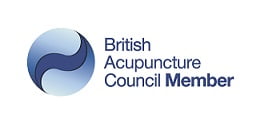Questions you may have
Acupuncture restores, promotes and maintains health. It is used to treat both physical and emotional difficulties with the emphasis always on treating the root of the problem.
It is possible with acupuncture to feel more energised and have a greater sense of well-being offering the potential to be well in ways never before experienced or imagined. You may notice other niggling problems resolve as your main health complaint improves.
It can effectively be used alongside conventional medicine.
No. It is a myth that you need to believe in acupuncture for it to work. Acupuncture is not a belief system.
Acupuncture is one of the safest medical treatments, both within conventional and complementary medicine. The needles used are sterile, single-use and disposable. There are very few side effects from acupuncture when practised by a fully qualified acupuncturist who follows a safe code of practice. Responses to treatment can sometimes include tiredness or mild dizziness and very occasionally minor bruising may occur. However, all such reactions are short-lived. Cupping and GuaSha can sometimes temporarily mark the skin. Such bruising is painless and generally clears within couple of days.
Most people describe acupuncture as relaxing; some may feel a tingling sensation, warmth or dull ache. This is a good sign that the body’s Qi is being stimulated.
Yes. The needles used in acupuncture are much finer than those used for injections and blood tests. You may not even feel them or notice them once they are in place. Many people who are afraid of needles have successfully had acupuncture but you may want to have an initial chat before having the treatment.
As well as using needles for your treatment I may use other Chinese Medicine techniques such as:
- cupping: glass cups are placed on the skin creating vacuum to stimulate blood flow and clear stagnant Qi
- moxibustion: heat is applied to a meridian or an acupuncture point using therapeutic herb (moxa) to warm and relax muscles and Qi
- guasha: skin is rubbed vigorously to increase blood flow and clear stagnant Qi
- tuina: Chinese therapeutic massage relieves muscle tension, opens energy meridians, stimulates acupressure points and stimulate the flow of Qi
There are a number of different diagnostic methods used to get a complete picture of your health and lifestyle, including taking a full medical history, looking at your tongue and taking pulses on both wrists. Questions will be asked about your current symptoms as well as your sleeping pattern, appetite, digestion and your emotional wellbeing. Women are also asked about their menstrual cycle and any past pregnancies and childbirths. You might feel that some questions appear unrelated to your condition but the information you give helps to form a more complete picture of your health and lifestyle. Based on this information your diagnosis and a personal treatment plan will be made specifically for you.
Many commonly used acupuncture points are located on the lower arms and legs, so it is helpful to wear clothing that allows easy access to these areas.
Some people turn to acupuncture for help with specific symptom or condition. Others choose to have treatment to help maintain good health, as a preventative measure, or to improve their general sense of wellbeing.
Traditional acupuncture aims to treat the whole person rather than specific symptom in isolation, it can be effective for a range of conditions.
There is a lot of research into which symptoms respond well to acupuncture, but the important thing is to find a practitioner you feel confident will work with you as an individual treating both you and your symptoms. You can always book free 15 mins consultation with Vaiva.
For more information about modern research into acupuncture effectiveness please visit the British Acupuncture Council’s website.
Make sure you do not have a large meal within the hour before your appointment as you may need to lie on your stomach. Ideally avoid alcohol and caffeine for 24 hours before and after your treatment. Most people feel calm and relaxed after their session. You may feel a little sleepy or tired and should take this into account, so if possible try to plan treatments when you have time to rest or do something enjoyable afterwards. Best to avoid vigorous exercise after treatment.
The most commonly used acupuncture points are located on the legs and arms; however there are some instances when your practitioner may need to locate points elsewhere on the body. Your practitioner will always ensure you feel comfortable throughout your treatment.
Everyone reacts differently to acupuncture so the amount and frequency of treatments needed will vary from person to person, it also depends on your condition. Chronic conditions may take longer to treat as the body is further along in the disease process; acute conditions often require fewer treatments. Early on in treatment, many patients report feeling better in themselves with an improved sleeping pattern and a gradual improvement on their primary condition.
If you are on medication from the doctor and you are considering having acupuncture we do recommend you let the doctor know. You should also tell your acupuncturist of any medication and supplements you are on as this may affect your response to acupuncture treatment. Make sure you do not stop taking any medication. The acupuncture treatment may enable you to reduce or even stop taking some forms of medication but you should ALWAYS consult your doctor regarding any change of prescription. Acupuncture compliments western medicine and any reduction in medication should be thoroughly discussed with your GP first.
